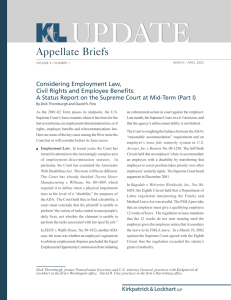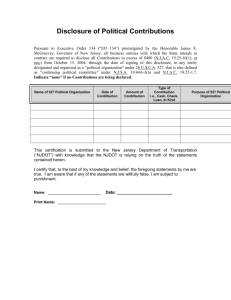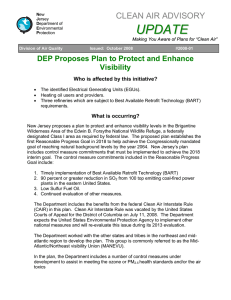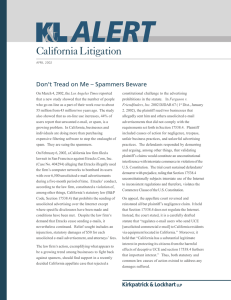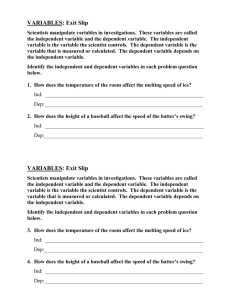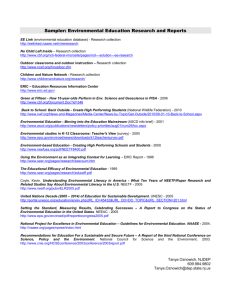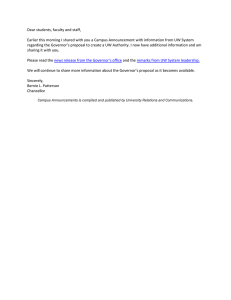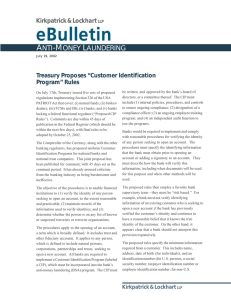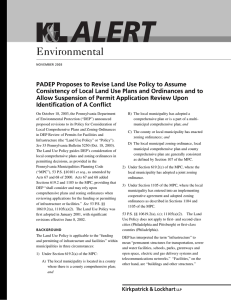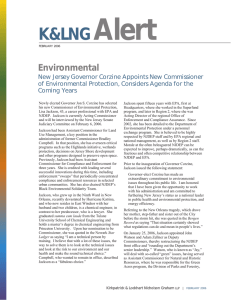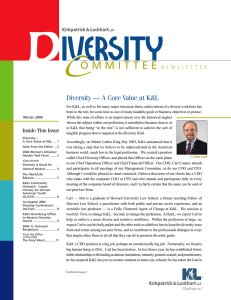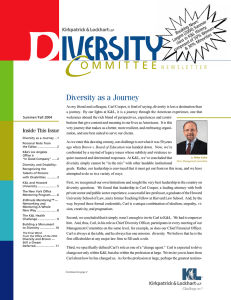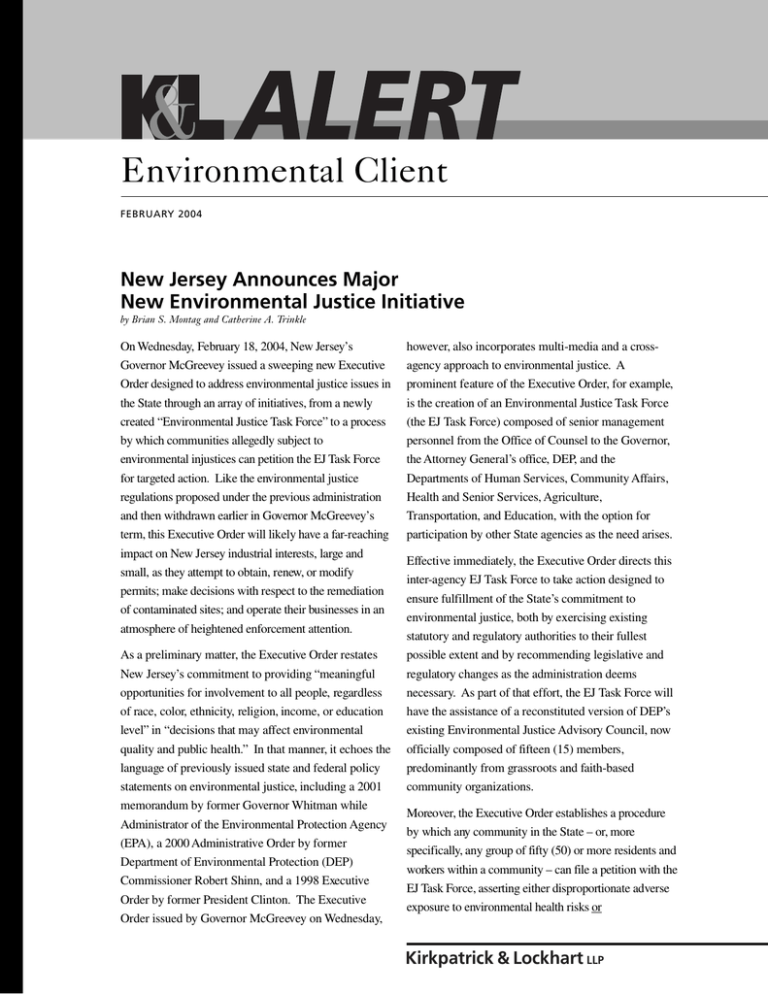
Environmental Client
FEBRUARY 2004
New Jersey Announces Major
New Environmental Justice Initiative
by Brian S. Montag and Catherine A. Trinkle
On Wednesday, February 18, 2004, New Jersey’s
Governor McGreevey issued a sweeping new Executive
Order designed to address environmental justice issues in
the State through an array of initiatives, from a newly
created “Environmental Justice Task Force” to a process
by which communities allegedly subject to
environmental injustices can petition the EJ Task Force
for targeted action. Like the environmental justice
regulations proposed under the previous administration
and then withdrawn earlier in Governor McGreevey’s
term, this Executive Order will likely have a far-reaching
impact on New Jersey industrial interests, large and
small, as they attempt to obtain, renew, or modify
permits; make decisions with respect to the remediation
of contaminated sites; and operate their businesses in an
atmosphere of heightened enforcement attention.
As a preliminary matter, the Executive Order restates
New Jersey’s commitment to providing “meaningful
opportunities for involvement to all people, regardless
of race, color, ethnicity, religion, income, or education
level” in “decisions that may affect environmental
quality and public health.” In that manner, it echoes the
language of previously issued state and federal policy
statements on environmental justice, including a 2001
memorandum by former Governor Whitman while
Administrator of the Environmental Protection Agency
(EPA), a 2000 Administrative Order by former
Department of Environmental Protection (DEP)
Commissioner Robert Shinn, and a 1998 Executive
Order by former President Clinton. The Executive
Order issued by Governor McGreevey on Wednesday,
however, also incorporates multi-media and a crossagency approach to environmental justice. A
prominent feature of the Executive Order, for example,
is the creation of an Environmental Justice Task Force
(the EJ Task Force) composed of senior management
personnel from the Office of Counsel to the Governor,
the Attorney General’s office, DEP, and the
Departments of Human Services, Community Affairs,
Health and Senior Services, Agriculture,
Transportation, and Education, with the option for
participation by other State agencies as the need arises.
Effective immediately, the Executive Order directs this
inter-agency EJ Task Force to take action designed to
ensure fulfillment of the State’s commitment to
environmental justice, both by exercising existing
statutory and regulatory authorities to their fullest
possible extent and by recommending legislative and
regulatory changes as the administration deems
necessary. As part of that effort, the EJ Task Force will
have the assistance of a reconstituted version of DEP’s
existing Environmental Justice Advisory Council, now
officially composed of fifteen (15) members,
predominantly from grassroots and faith-based
community organizations.
Moreover, the Executive Order establishes a procedure
by which any community in the State – or, more
specifically, any group of fifty (50) or more residents and
workers within a community – can file a petition with the
EJ Task Force, asserting either disproportionate adverse
exposure to environmental health risks or
Kirkpatrick & Lockhart LLP
disproportionate adverse effects. The meaning behind
this distinction between exposures and effects is unclear
at present but could signify an intent to account for – and
impose additional regulatory requirements based on –
poor health in a particular community, regardless of
whether it results from environmental exposures or
personal habits, such as smoking.
■
DEP and the Department of Transportation – in an
apparent effort to address soot, arsenic, and
mercury issues – are to “develop a coordinated
strategy for reducing the public’s exposure to fine
particulate pollution in affected communities,
particularly from diesel emissions from stationary
and mobile source”; and
The EJ Task Force is then to “identify a set of
communities from the petitions filed, based on a[n
undefined] selection criteria” and meet with the
petitioners, who can choose whether that meeting takes
place privately or through a public meeting. After the
meeting and based on further consultation, the EJ Task
Force is to develop an Action Plan for each community
at issue that addresses environmental, social and
economic factors affecting health or the environment.
In effect, the EJ Task Force has been directed to both
reduce existing environmental burdens and avoid or
reduce the imposition of additional environmental
burdens. The EJ Task Force is then to monitor the
implementation of its Action Plans and issue a report
on the status of each within the next eighteen (18)
months.
■
DEP and DHSS are to conduct “chronic health
surveillance, health monitoring, [and] data
gathering” in communities selected by the EJ Task
Force for the development of Action Plans.
Finally, in addition to the collective inter-agency efforts
of the EJ Task Force, the Executive Order directs the
individual state agencies involved to work together on
specific issues. For example:
■
DEP and the Department of Health and Senior
Services (DHSS) are to develop Spanish-language
websites to communicate public health and
environmental information to the State’s Hispanic
population;
■
DEP, DHSS, and Department of Agriculture are “to
develop and issue appropriately protective fish
consumption advisories” and otherwise
communicate the risks of fish consumption in
contaminated areas through education and public
information programs;
The Executive Order represents a significant and
expansive change in the McGreevey administration’s
policies on environmental justice, which will likely
impact development, permitting and brownfield
projects throughout the State.
BRIAN S. MONTAG
bmontag@kl.com
973.848.4044
CATHERINE A. TRINKLE
ctrinkle@kl.com
973.848.4052
FOR MORE INFORMATION about this Alert or Kirkpatrick &
Lockhart’s environmental practice, please contact the authors or one
of the K&L office contacts below. You may also visit our website at
www.kl.com.
Michael DeMarco
Robert Everett Wolin
R. Timothy Weston
Frederick J. Ufkes
Daniel A. Casey
William H. Hyatt, Jr.
Warren H. Colodner
Richard W. Hosking
Edward P. Sangster
Barry M. Hartman
Boston
617.951.9111
Dallas
214.939.4909
Harrisburg
717.231.4504
Los Angeles
310.552.5079
Miami
305.539.3324
Newark
973.848.4045
New York
212.536.3912
Pittsburgh
412.355.8612
San Francisco 415.249.1028
Washington
202.778.9338
mdemarco@kl.com
rwolin@kl.com
tweston@kl.com
fufkes@kl.com
dcasey@kl.com
whyatt@kl.com
wcolodner@kl.com
rhosking@kl.com
esangster@kl.com
bhartman@kl.com
®
Kirkpatrick & Lockhart LLP
Challenge us. ®
www.kl.com
BOSTON
■
DALLAS
■
HARRISBURG
■
LOS ANGELES
■
MIAMI
■
NEWARK
■
NEW YORK
■
PITTSBURGH
■
SAN FRANCISCO
■
WASHINGTON
.........................................................................................................................................................
This publication/newsletter is for informational purposes and does not contain or convey legal advice. The information herein
should not be used or relied upon in regard to any particular facts or circumstances
first consulting
a lawyer.
KIRKPATRICK without
& LOCKHART
LLP ENVIRONMENTAL
ALERT
© 2004 KIRKPATRICK & LOCKHART LLP.
ALL RIGHTS RESERVED.

